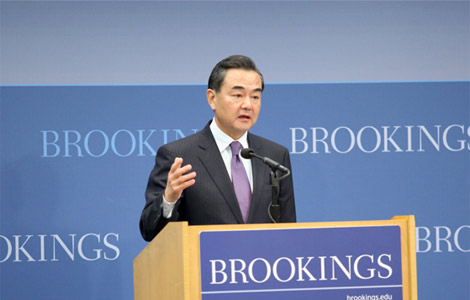President Xi gives speech to Indonesia's parliament
By Wu Jiao ( chinadaily.com.cn )
Updated: 2013-10-02
12:00
The Chinese people, too, offered their sympathy and assistance in a variety of ways to the Indonesia people hit by the disaster. An old man in Hangzhou, who was not rich himself as his wife was hospitalized for a long time and he himself had just gone through a surgery, donated 1,000 yuan of his hard earned money to Indonesian kids in disaster-affected areas for their continued schooling. The donation, though not a bit sum, speaks to the profound goodwill of the Chinese people to the Indonesian people.
Likewise, the Indonesian people have extended a helping hand when the Chinese people experienced major natural disasters. On 12 May 2008, a massive earthquake hit Wenchuan, China. People in the affected areas were in dire need of assistance and relief. Indonesia responded immediately and sent its medical team to quake-hit areas. As soon as it arrived, the Indonesian medical team worked around the clock in spite of the many aftershocks. They treated 260 earthquake victims and provided free medical treatment to 844 local residents and 120 students. Before returning to Indonesia, they donated all their valuable belongings to the quake-affected areas. Back in Indonesia, people made donations both in cash and kind to the quake-stricken Wenchuan. Some Indonesians personally visited the Chinese Embassy in Indonesia to express their prayers and blessings to the people in Wenchuan. What they did has deeply moved the Chinese people.
|
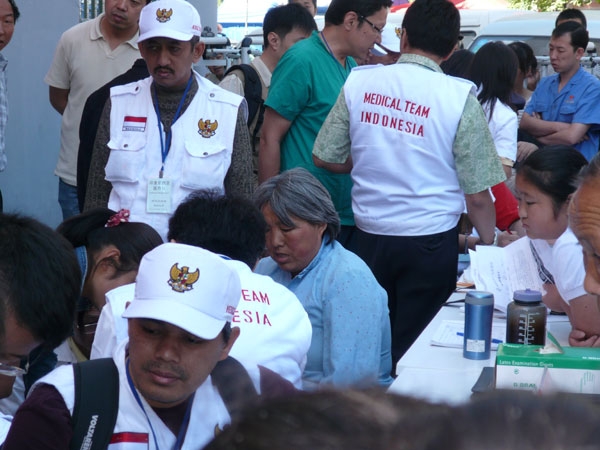 |
There are countless touching stories like these about friendly ties between our peoples. They are all examples of what is captured by one common proverb in both the Chinese and Indonesian languages, namely “going through thick and thin together”.
11:56
People in Indonesia often say, “It’s easy to make money but difficult to make friends.” The sincere friendship between the Chinese and Indonesian people is indeed our cherished, priceless treasure.
On 26 December 2004, a sudden massive earthquake of magnitude 9 hit the once tranquil Indian Ocean and triggered a large tsunami. The whole world was shocked to see Aceh of Indonesia suffering huge losses of life and property. After the tsunami, China immediately activated the emergency response mechanism and announced on the day of the earthquake that it would provide assistance to Indonesia and other disaster-affected countries. It became the largest overseas rescue and relief operation that China had ever launched after the founding of the People’s Republic. Trucks carrying relief supplied were given green lights all the way and rushed from factories to airport, and airplanes, loaded with the love and sympathy of the Chinese people toward the Indonesian people, flew to Aceh and other disaster-hit areas. The Chinese international rescue team was the first foreign team to arrive at Aceh. They provided medical treatment to over 10,000 victims in a short span of 13 days. Many local people learned to speak Chinese and hailed members of the Chinese rescue team in Chinese, “zhongguo, beijing, wo ai ni”(China, Beijing, I love you.)
11:50
Ladies and Gentlemen:
Dear Friends,
During my current visit, President Yudhoyono and I have jointly announced our decision to upgrade our bilateral relations to a comprehensive strategic partnership, with a view to building on past achievements and bringing about all-round and in-depth growth of our relationship.
The growing mutual trust between the two countries has put our bilateral relations on a more solid political basis. Our practical cooperation has expanded from such traditional areas as economy, trade, finance, infrastructure, energy, resources and manufacturing to include new fields such as space and maritime affairs. Our wide-ranging cooperation, from space to ocean, has delivered tangible benefits to the two peoples.
The Surabaya –Madura Bridge, a China-Indonesia joint project, is the longest cross-sea bridge in Southeast Asia. The cooperation project of Jatigede Dam is about to finish. Once completed, it will have an irrigation area of 90,000 hectares, which will greatly facilitate the work and life of the local people. We have enhanced our cooperation on major regional and international issues. Our relations have increasingly gained regional and international influences. All this is of positive significance to the building of a more just and equitable international political and economic order.
All these are important landmarks of China-Indonesia friendship in the new era.
11:47
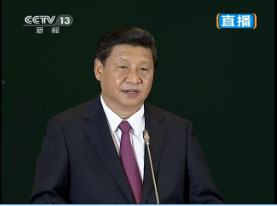
11:45
Over the centuries, the vast oceans have served as the bond of friendship connecting the two peoples, not a barrier between them. Vessels full of goods and passengers travelled across the sea, exchanging products and fostering friendship. A Dream of Red Mansions, a Chinese classic novel, gives vivid accounts of rare treasures from Java. The National Museum of Indonesia, on the other hand, displays a large number of ancient Chinese porcelains. All these bear witness to the friendly exchanges between the two peoples. And they are convincing interpretation of the Chinese saying that “A bosom friend afar brings a distant land near.”
Our two peoples sympathized with and supported each other in their respective struggle for national independence and liberation in the last century. Indonesia was among the first countries to establish diplomatic ties with the People’s Republic of China after its founding in 1949. In 1955, China and Indonesia, together with other Asian and African countries, jointly initiated the Bandung spirit at the Bandung Conference. With the principles of peaceful coexistence and seeking common ground while shelving differences at its core, the Bandung spirit remains an important norm governing state-to-state relations, and has made indelible contribution to the building of new international relations. Our two countries resumed diplomatic ties in 1990 and established a strategic partnership in 2005, which marked the start of a new phase in the growth of our bilateral relations.
Ladies and Gentlemen:
Dear Friends,
China and Indonesia face each other across the sea. The friendly ties between us have a long history. Together, our peoples have composed one piece after another of beautiful music about their exchanges and interactions over the centuries. Just as the Indonesian folk song Bengawan Solo, a household musical piece in China, goes “Your water springs forth from Solo, caged by a thousand mountains. Water flows to reach far distances, eventually to the sea.” Like the beautiful river Solo, China-Indonesia relations have traversed an extraordinary journey, past mountains and eventually to the sea.
As early as the Han Dynasty in China about 2,000 years ago, the people of the two countries opened the door to each other despite the sea between them. In the early 15th century, Zheng He, the famous Chinese navigator of the Ming Dynasty, made seven voyages to the Western Seas. He stopped over the Indonesian archipelago in each of his voyages and toured Java, Sumatra and Kalimantan. His visits left nice stories of friendly exchanges between the Chinese and Indonesian peoples, many of which are still widely told today.
11:36
I visited Indonesia 20 years ago, during which I personally experienced the development, colorful scenery and diversified culture of Indonesia. How time flies. But what I saw 20 years ago is still vivid in my mind, as if it only happened yesterday. As I set foot on this beautiful land again this time, I am even more impressed by the robust vitality of our bilateral relations and the profound friendship between the two peoples.
In recent years, under the leadership of President Yudhoyono, the Indonesian people have pulled together, made tremendous efforts and achieved success in economic development, social stability and growing national strength. I sincerely wish the Indonesian people further success in forging a better future through hard work and creativity.
11:35
Dear Friends,
Apa Kabar! Good morning. It gives me great pleasure to come to the People’s Representative Council of Indonesia and meet all the friends here.
I am visiting Indonesia, known as “country of thousands islands”, at the invitation of President Susilo Bambang Yudhoyono. This is the first leg in my current visit to Southeast Asia. It is a journey for carrying forward traditional friendship and also for planning future cooperation.
11:33
Indonesian Speaker of the House of Representatives Marzuki Alie delivers a welcome speech to Xi Jinping.
11:21
Dr. Eddy Sadeli, a member of the Indonesian parliament, says Xi's visit is key to China-Indonesia relations. He said Indonesia is an important country in ASEAN and plays a critical role in the development of China-ASEAN ties.
11:18
Indira Nadya says she is looking forward to Xi's speech and has a strong interest in applying for scholarships China offers to Indonesian people.
11:00
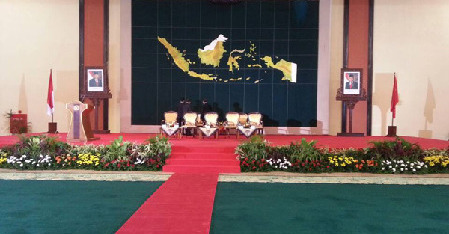
President Xi will deliver a speech. [Photo by Wu Jiao]
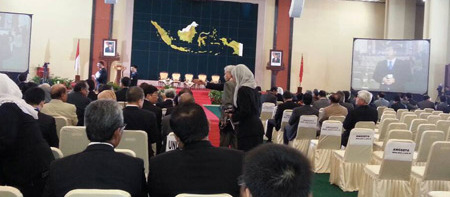
Schedule

President Xi visits Indonesia, Malaysia, attend APEC summit
Oct 2 to 3: Pay State Visit to Indonesia
Oct 4 to 5: Pay State Visit to Malaysia
Oct 6 to 8: Attend the 21st economic leaders' meeting of APEC forum and meet with global leaders in Bali, Indonesia
Forum
China should increase investment in ASEAN
China should ratchet up cooperation with Association of Southeast Asian Nations countries to expand Beijing's regional influence while countering Washington's Asia-Pacific pivot strategy.
Territorial disputes remain an obstacle
To a lesser extent, relations may also be negatively affected by internal problems involving treatment of ethnic Chinese minorities.








